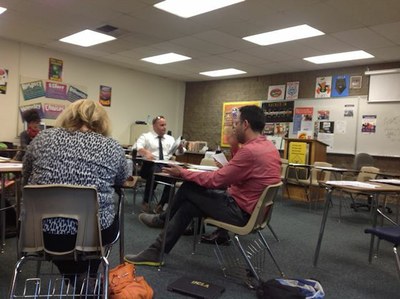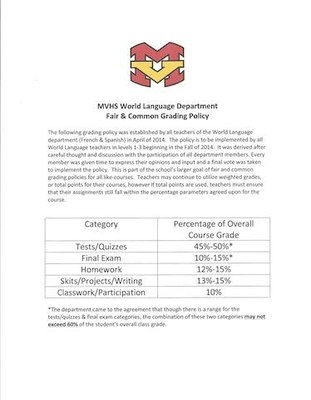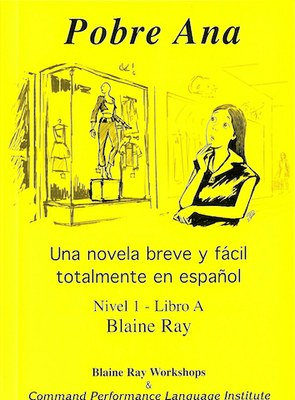Curriculum Leader, World Languages
Overview
With the lack of funding available to schools over the last few years, one of the consequences at Mission Viejo High School was an elimination of Department Chairs 5 years ago. This year, for the first time since, the district mandated that a leadership team be put back into place at each school. At the high school level, these would be compromised of curriculum leaders representing academic departments and other programs on campus. In September the Principal put out a call to all faculty interested in becoming curriculum leaders to represent their respective departments at all bi-monthly leadership meetings and activities and events that the leadership team would be responsible for (faculty meeting presentations, etc.), as well as take the lead in department meetings and represent his/her colleagues in curricular matters.
Role as Curriculum Leader
After filling out an application and interviewing with the Principal I was chosen as the Curriculum Leader for the World Languages Department. I have attended leadership meetings twice a month since September, made-up of the other Curriculum Leaders, as well as all of the school's administrators.  The bulk of the meetings have centered around the curricular issue of how to address MVHS' two critical needs from the WASC action plan: 1. Narrowing the achievement gap between White students and English Learners, Hispanic and Socio-economically Disadvantaged. 2. Providing appropriate support and systematic intervention programs to help all students reach their maximum potential. Within these two broader contexts, specific focus has been on fair and common grading policies, access and awareness to a-g and higher-level courses, and the transition to the Common Core State Standards. Apart from participating in the discussions that take place during the curriculum meetings, I have also supported MVHS's critical needs by:
The bulk of the meetings have centered around the curricular issue of how to address MVHS' two critical needs from the WASC action plan: 1. Narrowing the achievement gap between White students and English Learners, Hispanic and Socio-economically Disadvantaged. 2. Providing appropriate support and systematic intervention programs to help all students reach their maximum potential. Within these two broader contexts, specific focus has been on fair and common grading policies, access and awareness to a-g and higher-level courses, and the transition to the Common Core State Standards. Apart from participating in the discussions that take place during the curriculum meetings, I have also supported MVHS's critical needs by:
- Facilitating a Socratic Seminar with approximately 15 teachers from all content areas regarding fair grading practices and the implications for student achievement and pedagogical practices
- Leading the World Language department in establishing a fair and common grading policy across levels 1-3 to be implemented in the Fall of 2014 (additional evidence)
- Organization of ordering TPRS (Teaching proficiency through reading & storytelling) materials for World Language level 1, and coordination of dispersement of materials (Pobre Ana novel and supplementary materials) as the department moves toward the goal of the implementation of improving literacy starting at the novice level
- Guiding all Department meetings, on average, once per month

Reflection
After working at MVHS for 9 years, I felt that it was excellent timing to apply for a leadership position under the new Curriculum Leader Model. Since it was made clear that many of the duties that had been part of the former Department Chair position (ordering supplies, helping create the master schedule, etc.) would not be part of the newly created positions, it was very appealing to me to be able to focus on curriculum, at both the school level and within my own department. Taking this position was also a way to really put into practice many of the theories and ideas that we were learning about and discussing in PLI almost immediately and on a daily basis. What I immediately tried to do from the very first department meeting was demonstrate democratic leadership. As many members in my dept. had previously had many disagreements and tension between themselves, I started off the first meeting asking everyone to please try to wipe the slate clean and start fresh, letting go of any negative feelings and emotions they may be harboring. I shared with them that I was growing and evolving both personally and professionally, especially within the context of leadership and wanted to respect everyone's opinions and experiences. I now know, after taking Prof. Price's course, I was demonstrating professional authority by exhibiting authentic respect for my colleague's voice. I also immediately began exhibiting what I believe to be Democratic Leadership by asking for everyones's opinion and input anytime curricular decisions were being made at department meetings. I would open the floor for discussion, and ensure that my colleagues were allowed to finish their thoughts before being cut off by someone else (which many people tried to do). After general discussions took place, I would then ask each teacher individually if he/she had anything additional they would like to share in front of the whole group. When it was time to make a final decision, we would all vote, and I would make sure that everyone had voted one way or another. I believe demonstrating both professional authority and democratic leadership served me, and my department quite well this year. Many teachers in my department complimented me on my leadership style and added that they were grateful everyone was allowed to express their opinions at meetings. One of the bigger victories for me this year in this new position was being able to establish professionalism and respect with a colleague with whom I could never really get along with before this year. Before PLI, I would have probably dismissed anything she had to say because I felt that she never respected me, and ignore her, or cut her off if I didn't agree with her. By evolving into a democratic leader and showing her that I valued her opinion, she slowly began showing me what I perceive as professionalism. There is no longer tension between us when we meet, and I do not dread department meetings knowing I will have to work with her. We are by no means best friends, and I still don't agree with everything she says or believes, but we are able to keep it professional and I still show her respect by allowing her to express her opinion and input.
Being a curriculum leader has also allowed me to gain confidence in my leadership abilities because I have been able to see the results and effects of demonstrating democratic leadership. It has pushed me outside of my comfort zone and made me really listen to opinions that differ greatly from my own and collaborate with all kinds of personalities as we work toward the common goal of improving student achievement. It has also given me the confidence to use my own voice and champion for a democratic education in which all stakeholders voices are heard.
CPSEL Connection
CPSEL 1: Facilitating the development, articulation, implementation, and stewardship of a vision of learning that is shared and supported by the school community.
- 1.1 Develop a shared vision (Fair & Common grading practices, Access to and awareness of higher level and a-g courses for all students)
- 1.2 Plan and implement activities around the vision (Department & Curriculum Leadership Meetings, Socratic Seminar on fair grading practices)
- 1.3 Allocate resources to support the vision (Implementation of TPRS novel Pobre Ana in Spanish level 1 curriculum)
CPSEL 2: Advocating, nurturing, and sustaining a school culture and instructional program conducive to student learning and staff professional growth.
- 2.2 Guide the instructional program (Curriculum Leadership meetings focused on WASC action plan items and creation of steps for interventions and access)
- 2.3 Guide professional growth of staff (Leading socratic seminar with teachers from various content areas on fair grading practices)
CPSEL3: Ensuring management of the organization, operations, and resources for a safe, efficient, and effective learning environment.
- 3.2 Create an infrastructure to support an effective learning environment (Creation of fair and common grading policy for the World Language department (Spanish & French) for levels 1-3
CPSEL 5: Modeling a personal code of ethics and developing professional leadership capacity.
- 5.1 Maintain ethical standards of professionalism (Demonstrated at all department meetings, using democratic leadership and professional authority)
- 5.3 Sustain professional commitment and effort (Demonstrated at all department meetings, using democratic leadership and professional authority
CPSEL 6: Understanding, responding to, and influencing the larger political, social, economic, legal, and cultural context.
- 6.1 Engage with the policy environment to support school success (Through Curriculum Leadership and department meetings, as fair and common grading policies were established as a school priority and created in the World Language Department to be implemented Fall 2014 in all levels 1-3
- 6.2 Interact with stakeholders (Through Curriculum and Leadership and department meetings, interaction with teachers & administrators)


